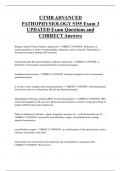UTMB ADVANCED
PATHOPHYSIOLOGY 5355 Exam 3
UPDATED Exam Questions and
CORRECT Answers
Biogenic Amine Theory linked to depression - CORRECT ANSWER- Deficiency of
neurotransmitters in brain of norepinephrine, dopamine, and/or serotonin. Particularly, a
decrease in receptor binding with serotonin.
Neurotransmitter Receptor Hypothesis linked to depression - CORRECT ANSWER- A
deficiency of monoamine neurotransmitters at neuronal synapses.
Antidepressants increase - CORRECT ANSWER- Neuronal synaptic levels of monoamine
neurotransmitters.
if you have more receptors than neurotransmitters - CORRECT ANSWER- Neurotransmitters
do not have time to re-charge thus, they do not function properly.
Hypothalamic-Pituitary-Adrenal (HPA) System Dysregulation - CORRECT ANSWER- HPA
system dysregulation with excessive glucocorticoid secretion is found in a large percentage of
people suffering from major depression.
Patho of Alzheimer's includes - plaque formation, presence of --, with decreased levels of - -
CORRECT ANSWER- Amyloid B, neurofibrillary tangles, acetylcholine these disrupt
impulse transmission
neurofibrillary tangles - CORRECT ANSWER- are a deformation of the structure that carries
nutrients to neurons of the brain.
Decreased levels of choline acetyl transferase and acetylcholine is associated with -
CORRECT ANSWER- Memory loss
,Most common cause of dementia - CORRECT ANSWER- Alzheimer's disease fatal 5-10
years
Characteristics of Alzheimer's - CORRECT ANSWER- Loss of memory, language , inability
to learn new things, dysfunction, delusions, cannot perform ADLs, majorly effects social life
Parkinson's Disease is - CORRECT ANSWER- Chronic motor progressive neuro-
degenerative known as a shaking palsy
Parkinson's disease is associated with - CORRECT ANSWER- basal ganglia dysfunction and
atrophy of neurons in the substantia nigra that produce dopamine;
Characteristics of Parkinson's disease - CORRECT ANSWER- Tremors at rest, rigidity,
bradykinesia, muscular rigidity and postural abnormalities.
2 Main Categories of CVA - CORRECT ANSWER- Hemorrhagic and Ischemic
Hemorrhagic CVA - CORRECT ANSWER- Blood produces inflammatory reaction, swelling,
displaces brain tissue and increases ICP
2 types of hemorrhagic stroke - CORRECT ANSWER- Intracerebral and subarachnoid
Intracerebral Hemorrhage - CORRECT ANSWER- Blood vessel leaks directly into brain
tissue
Subarachnoid hemorrhage - CORRECT ANSWER- Bleeding into the subarachnoid space,
caused by trauma, aneurysm rupture presents as "worst headache of life". surgical emergency
Ischemic CVA - CORRECT ANSWER- reduction in cerebral blood flow results in hypoxia
and irreversible cell death with associated cerebral edema
3 types of ischemic CVA - CORRECT ANSWER- thrombotic, embolic, hypercoagulable
states.
, Thrombotic - CORRECT ANSWER- caused by atherosclerosis blocking vessels. obstruction
of blood vessel due to localized occlusive process
Embolic - CORRECT ANSWER- caused by blood clot, fat or air embolus traveling from
distant site to brain
Hypercoaguable state - CORRECT ANSWER- conditions such as sickle cell disease,
polycythemia causing blood clot to form and obstruct vessel
Multiple sclerosis - CORRECT ANSWER- chronic, inflammatory autoimmune
demyelinating disease of the CNS. : patho includes CNS demyelination thought to be caused
by an immune reaction
Acetylcholine - CORRECT ANSWER- excitatory or inhibitory, enables muscle action,
learning, memory- involved in memory impairment in Alzheimer's disease
Norepinephrine - CORRECT ANSWER- Helps control alertness and arousal. Under supply
can depress mood.
Serotonin - CORRECT ANSWER- inhibitory, involved with mood, hunger, sleep, and
arousal- insufficient linked to depression, involved in migraine headaches, Prozac and
antidepressant drugs raise levels
Dopamine - CORRECT ANSWER- excitatory, influences movement, learning, emotions,
pleasure, decreased levels associated with tremors in parkinson's and depression, excess
linked to schizophrenia
GABA - CORRECT ANSWER- major inhibitory, undersupply linked to anxiety, seizures,
tremors and insomnia
Glutamate - CORRECT ANSWER- A major excitatory neurotransmitter; involved in
memory, oversupply can overstimulate brain producing migraines or seizures (MSG)
PKU - CORRECT ANSWER- is a rare, inherited disorder that causes increased the levels of
phenylalanine in the blood due to a defect in the gene that helps create an enzyme, tyrosine




